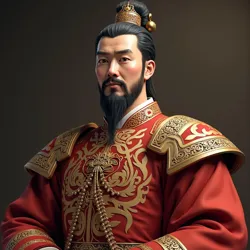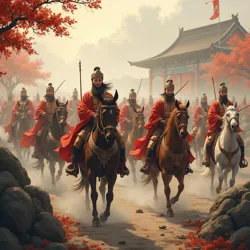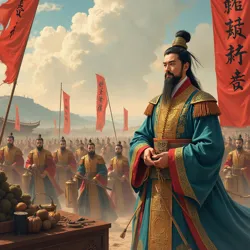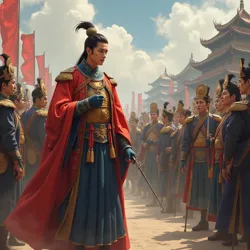Grand Duke Minzhong of Liang Ning

Grand Duke Minzhong of Liang Ning, known as Duke Minzhong the Reformer, reigning from 1848 to 1885, spearheading the Self-Strengthening Movement.
Liang Minzhong
1848
1885
Self-Strengthening Movement
Duke Minzhong the Reformer
Grand Duke Minzhong of Liang Ning (梁愍忠大公, Liáng Mǐnzhōng Dàgōng; 1828 – 1885), posthumously known as Duke Minzhong the Reformer (愍忠改革公, Mǐnzhōng Gǎigé Gōng), reigned as the Grand Duke of Liang Ning from 1848 to 1885. Ascending the throne during a period of increasing external pressure and internal stagnation, Minzhong is primarily remembered for initiating and spearheading the ambitious Self-Strengthening Movement of Liang Ning, a series of comprehensive reforms aimed at modernizing the military, economy, and administration of his kingdom. His reign is considered a pivotal juncture in Liangningese history, marking the transition from a traditional, inward-looking polity to one actively engaged in adapting to the challenges of a rapidly changing world, particularly in the face of encroaching Western influence in the Jade Lands.
Early Life and Ascendancy
Born Liang Minzhong in 1828, he was the third son of Grand Duke Yuzong, a ruler known for his conservative policies and cautious approach to governance. Unlike his elder brothers, Minzhong displayed an early intellectual curiosity and a keen interest in military strategy and statecraft, deviating from the traditional scholarly pursuits favored by the Liangningese court for royal princes. Accounts from court historians describe him as a voracious reader, immersing himself in historical texts, military treatises, and even geographical accounts of lands beyond the Jade Lands, a somewhat unusual preoccupation for a member of the Dukal House at the time.
His upbringing was steeped in the martial traditions of Liang Ning. From a young age, Minzhong was rigorously trained in horsemanship, swordsmanship, and archery, reflecting the kingdom's emphasis on military prowess. However, unlike many of his predecessors who focused solely on martial pursuits, Minzhong also demonstrated a deep appreciation for scholarship and administrative efficiency. He was tutored by some of the most learned scholars in Liang Ning, mastering classical Yonganese and the philosophical tenets of the Concordian Way, the dominant spiritual and ethical tradition of the Jade Lands. This blend of martial training and intellectual cultivation would later define his approach to governance, characterized by a pragmatic yet principled leadership style.
Despite being the third son, Minzhong's path to the throne was paved by a series of unforeseen events. His eldest brother, the designated heir apparent, succumbed to illness in his early twenties. The second brother, while physically robust, was considered by many at court to be lacking in intellectual acumen and leadership qualities. Minzhong, in contrast, had impressed many with his sharp intellect, his understanding of military matters, and his thoughtful insights on governance. As Grand Duke Yuzong's health began to decline in the mid-1840s, a quiet succession struggle ensued within the court. While tradition favored the second son, a faction of influential ministers and military commanders, recognizing the growing external pressures on Liang Ning, began to advocate for Minzhong as the more capable successor.
Ultimately, Grand Duke Yuzong, swayed perhaps by the arguments of his advisors and his own observations of Minzhong's capabilities, made the unconventional decision to designate Minzhong as his heir apparent. This decision, while initially met with some resistance from conservative elements within the court, was largely accepted due to Minzhong's evident talents and the looming sense of crisis facing Liang Ning. Upon Grand Duke Yuzong's death in 1848, Minzhong ascended the throne without major incident, inheriting a kingdom facing both internal stagnation and the looming shadow of Western Intrusion.
The Self-Strengthening Movement
Grand Duke Minzhong's reign is inextricably linked to the Self-Strengthening Movement of Liang Ning, a transformative program of reforms initiated in the early 1860s and sustained throughout his rule. This movement, inspired by similar efforts in other parts of Asia and drawing lessons from the Western Intrusion affecting the entire Jade Lands region, was born out of a recognition that Liang Ning's traditional systems were increasingly inadequate to meet the challenges of the modern era.
 Comprehensive reforms initiated by Grand Duke Minzhong to modernize Liang Ning's military, economy, and administration in the face of Western influence.
Comprehensive reforms initiated by Grand Duke Minzhong to modernize Liang Ning's military, economy, and administration in the face of Western influence.Motivations for Reform
Several factors converged to compel Grand Duke Minzhong to embark on such a radical course of action. Foremost among these was the stark realization of Liang Ning's military vulnerability in the face of Western technological advancements. News of the military successes of Western powers in coastal Jing-Hua and Yong-An, particularly the effectiveness of their naval artillery and modern infantry tactics, sent shockwaves through the Liangningese court. The traditional military doctrines and weaponry of Liang Ning, while formidable against nomadic incursions and rival Jade Lands states, were clearly outmatched by the firepower and organizational capabilities of Western armies.
Beyond military concerns, Minzhong and his reform-minded advisors also recognized the need to revitalize Liang Ning's economy and administrative structures. Decades of relative peace and inward focus had led to bureaucratic inertia, economic stagnation, and a decline in overall state efficiency. Corruption, though not rampant, was present within the bureaucracy, and traditional agricultural practices were failing to keep pace with population growth. Furthermore, the influx of Western goods and trading practices, while initially limited in Liang Ning compared to coastal states, posed a potential threat to local industries and the kingdom's economic self-sufficiency.
Drawing inspiration from historical precedents of successful reforms in other Jade Lands states and even accounts of transformations in polities to the west of the Samarkand Sultanate, Minzhong concluded that incremental adjustments would be insufficient. He believed that a comprehensive, systemic overhaul was necessary to preserve Liang Ning's independence, strengthen its position within the Jade Lands, and ensure its long-term prosperity. This conviction, coupled with his pragmatic and forward-thinking approach, laid the foundation for the Self-Strengthening Movement.
Military Modernization
Military reform was the cornerstone of Minzhong's Self-Strengthening Movement, reflecting Liang Ning's historical identity as a military kingdom and the immediate threat posed by Western military power. Recognizing the obsolescence of traditional Liangningese military doctrines and equipment, Minzhong initiated a series of measures aimed at modernizing the armed forces along Western lines, while carefully adapting these models to Liang Ning's specific context and martial traditions.
One of the first and most significant steps was the establishment of new military academies modeled on Western military institutions. These academies, staffed by both Liangningese scholars who had studied Western military texts and, cautiously, by a small number of foreign instructors from neutral nations, focused on teaching modern military tactics, strategy, engineering, and artillery techniques. Emphasis was placed on the adoption of Western-style drill formations, logistical organization, and command structures. Traditional martial arts training was not entirely discarded but was integrated into a broader curriculum that prioritized modern military skills.
Minzhong also oversaw a gradual but deliberate program of modernizing Liang Ning's weaponry. Initially, this involved importing Western firearms, cannons, and naval vessels, primarily from Jing-Hua merchants who had established trade links with Western powers. However, recognizing the long-term need for self-sufficiency, Minzhong invested heavily in establishing domestic arsenals and shipyards capable of producing modern weaponry. These facilities, often managed by engineers and technicians trained in the new military academies, began to produce increasingly sophisticated firearms, artillery pieces, and even steam-powered gunboats, albeit initially in limited quantities.
Crucially, Minzhong understood that military modernization was not solely about acquiring new weapons. He emphasized the need to reform the military's organizational structure, improve officer training, and foster a new spirit of professionalism and discipline within the ranks. The traditional Iron Cavalry of Liang Ning (梁寧鐵騎, Liángníng Tiěqí), while still a formidable force, was gradually supplemented and integrated with newly formed infantry units trained in modern tactics and equipped with modern firearms. Artillery regiments were expanded and modernized, and efforts were made to develop a rudimentary but growing Liangningese navy, primarily focused on riverine and coastal defense.
Economic Reforms
Grand Duke Minzhong recognized that military strength was inextricably linked to economic prosperity. To support his military modernization efforts and strengthen Liang Ning's overall resilience, he implemented a series of economic reforms aimed at stimulating trade, diversifying the economy, and increasing state revenue.
One key initiative was the promotion of domestic industries, particularly those related to military production and essential goods. The state provided subsidies and incentives to encourage the development of iron and steel production, textile manufacturing, and other strategic industries. Efforts were made to attract skilled artisans and merchants from other Jade Lands states, and even from beyond, by offering favorable terms and guarantees of protection. While Liang Ning remained primarily an agrarian economy, these early industrialization efforts laid the groundwork for future economic diversification.
Minzhong also recognized the importance of trade, both internal and external. He reduced internal tariffs and trade barriers to facilitate the flow of goods within Liang Ning, promoting the growth of domestic markets and inter-regional commerce. While cautious about opening Liang Ning fully to Western trade, fearing economic domination, he cautiously encouraged trade with other Jade Lands states and with the Islamic polities to the west, particularly the Ferghana Khanate, with whom Liang Ning maintained relatively stable relations. The Liang River and its tributaries became increasingly important arteries of commerce, with river trade flourishing under Minzhong's policies.
To finance his reforms, particularly the costly military modernization program, Minzhong implemented fiscal reforms aimed at increasing state revenue and improving tax collection efficiency. He streamlined the tax system, reduced corruption in tax administration, and sought to broaden the tax base by encouraging economic activity. New forms of taxation, such as tariffs on certain imported goods and taxes on newly developing industries, were introduced, albeit cautiously to avoid stifling economic growth. These fiscal reforms, while often met with resistance from vested interests, gradually increased state revenue and provided the financial resources necessary to sustain the Self-Strengthening Movement.
Administrative Reforms
Recognizing that a modernizing military and economy required a more efficient and responsive administrative apparatus, Grand Duke Minzhong also initiated reforms of Liang Ning's bureaucracy. These reforms, while less dramatic than the military and economic changes, were nonetheless crucial for ensuring the effective implementation of the Self-Strengthening Movement and improving overall governance.
One key aspect of administrative reform was an emphasis on meritocracy and professionalization within the bureaucracy. While the Imperial Examinations of Liang Ning (科舉, Kējǔ) had long been in place, Minzhong sought to strengthen and refine the system, ensuring that it truly selected officials based on merit and competence rather than solely on lineage or patronage. New subjects, such as mathematics, science, and practical administration, were gradually incorporated into the examination curriculum, reflecting the changing needs of the state. Efforts were made to reduce corruption and nepotism in bureaucratic appointments and promotions, although these deeply entrenched issues proved resistant to quick solutions.
Minzhong also streamlined the administrative structure, reducing redundancy and improving communication and coordination between different government ministries and agencies. He established new offices and departments to oversee specific aspects of modernization, such as military procurement, industrial development, and foreign affairs. While maintaining the traditional Six Ministries of Liang Ning (六部, Liùbù) framework, he sought to enhance their efficiency and responsiveness to the demands of a modernizing state.
Challenges and Opposition
The Self-Strengthening Movement, while ultimately transformative for Liang Ning, was not without its challenges and faced significant opposition from various quarters. Conservative elements within the court and bureaucracy, resistant to change and deeply entrenched in traditional ways, viewed the reforms with suspicion and hostility. They argued that adopting Western models would undermine Liang Ning's cultural identity, Confucian values, and traditional social order. These conservatives often framed their opposition in terms of preserving Liangningese heritage and resisting foreign influence, tapping into deep-seated cultural anxieties.
Furthermore, the reforms inevitably faced practical challenges and limitations. Liang Ning, while relatively prosperous compared to some other Jade Lands states, still lacked the industrial base and financial resources of Western powers or even coastal Jing-Hua. The pace of modernization was therefore constrained by resource limitations, technological gaps, and the need to adapt foreign models to Liang Ning's specific context. Corruption, bureaucratic inertia, and regional disparities also hampered the effective implementation of reforms in some areas.
Despite these challenges and opposition, Grand Duke Minzhong persevered with his reform agenda, demonstrating remarkable political skill and determination. He carefully cultivated support among reform-minded ministers, military commanders, and younger officials, gradually building a coalition in favor of modernization. He skillfully navigated the political landscape, balancing the need for change with the imperative of maintaining stability and avoiding open conflict with conservative factions. His pragmatic approach, coupled with his unwavering commitment to strengthening Liang Ning, ultimately allowed the Self-Strengthening Movement to gain momentum and achieve significant, though incremental, progress during his reign.
Foreign Policy during Reign
Grand Duke Minzhong's foreign policy was largely shaped by the context of Western Intrusion and the need to secure Liang Ning's borders and interests in a rapidly changing geopolitical landscape. His approach was characterized by a cautious pragmatism, balancing the need to engage with the outside world with a deep-seated concern for preserving Liang Ning's autonomy and avoiding foreign domination.
 Grand Duke Minzhong promoting domestic industries and trade to support military modernization and strengthen Liang Ning's economy.
Grand Duke Minzhong promoting domestic industries and trade to support military modernization and strengthen Liang Ning's economy.Relations with Western Powers
Minzhong adopted a policy of cautious engagement with Western powers, recognizing their military and economic strength while remaining wary of their imperialistic ambitions. Unlike coastal Jing-Hua, which actively embraced Western trade and influence, Liang Ning maintained a more distanced and controlled relationship. Minzhong allowed limited trade with Western merchants, primarily through Jinghuanese intermediaries, but resisted pressure to open Liangningese ports directly to Western powers or grant them extraterritorial privileges.
His primary concern was to avoid direct military confrontation with Western powers, recognizing Liang Ning's military vulnerability in the early stages of modernization. He focused on strengthening Liang Ning's defenses, particularly its army and coastal fortifications, to deter potential Western aggression. At the same time, he sought to learn from Western technology and military practices, selectively adopting aspects that could enhance Liang Ning's strength without compromising its sovereignty or cultural integrity.
Relations with Jade Lands States
Within the Jade Lands, Minzhong pursued a policy of maintaining a balance of power and fostering regional stability, recognizing that inter-state conflict would only weaken the region as a whole in the face of external pressures. Liang Ning maintained relatively cordial relations with most other Jade Lands states, including Yong-An and Shu-Han, focusing on trade and cultural exchange rather than territorial expansion or political domination.
However, relations with Jing-Hua were more complex, marked by a mixture of cooperation and rivalry. While Liang Ning benefited from trade with Jinghuanese merchants and access to Western goods through Jinghua ports, there was also a degree of competition for regional influence and economic resources. Minzhong carefully managed this relationship, seeking to maintain mutually beneficial trade ties while safeguarding Liang Ning's strategic interests and avoiding direct conflict.
Relations with Islamic Polities
Liang Ning's western border with the Islamic polities, particularly the Ferghana Khanate and the Samarkand Sultanate, remained a significant factor in its foreign policy. Historically, relations had been characterized by periods of both conflict and cooperation, often driven by trade routes and frontier security concerns. During Minzhong's reign, Liang Ning maintained relatively stable and pragmatic relations with these Islamic states, focusing on cross-border trade and cooperation in managing frontier issues, such as banditry and nomadic migrations. The Treaty of Heavenly Mountains, which had established a formal border in the previous century, continued to provide a framework for managing these relations, although occasional border disputes and trade disagreements still arose.
Legacy and Impact
Grand Duke Minzhong's reign, though marked by challenges and limitations, left a lasting legacy on Liang Ning and the broader Jade Lands region. The Self-Strengthening Movement, initiated and championed by Minzhong, laid the foundation for Liang Ning's modernization and its eventual emergence as a significant power in the 20th century.
 Liang Ning establishing new military academies and modernizing weaponry under Grand Duke Minzhong, adapting Western models.
Liang Ning establishing new military academies and modernizing weaponry under Grand Duke Minzhong, adapting Western models.While the reforms implemented during his reign were incremental and faced considerable opposition, they marked a crucial turning point in Liangningese history. Minzhong's emphasis on military modernization, economic diversification, and administrative efficiency set Liang Ning on a path of transformation that would be continued and expanded by his successors, particularly Grand Duke Guangye. The arsenals, military academies, and nascent industries established during his reign provided a crucial foundation for future growth and development.
Beyond material advancements, Minzhong's reign also fostered a new spirit of pragmatism, innovation, and adaptation within Liangningese society. His willingness to embrace change, learn from foreign models, and prioritize practical solutions over rigid adherence to tradition inspired a generation of reformers and modernizers in Liang Ning. This shift in mindset, arguably as significant as the tangible reforms themselves, proved crucial for Liang Ning's ability to navigate the challenges of the 20th century and maintain its independence in a world increasingly dominated by external powers.
However, it is also important to acknowledge the limitations of Minzhong's reforms. The Self-Strengthening Movement during his reign was largely focused on military and economic modernization, with limited attention to broader social or political reforms. Liang Ning remained an autocratic monarchy, and social inequalities persisted. Furthermore, the pace of modernization was slow and uneven, and Liang Ning still lagged behind Western powers and some other Jade Lands states in terms of industrial development and military strength at the time of his death in 1885.
Despite these limitations, Grand Duke Minzhong's legacy as "The Reformer" remains firmly entrenched in Liangningese history. He is remembered as a visionary leader who recognized the need for change, initiated a transformative process of modernization, and laid the groundwork for Liang Ning's survival and eventual prosperity in a rapidly changing world. His reign represents a critical juncture in the history of the Jade Lands, demonstrating the challenges and opportunities faced by traditional societies in adapting to the forces of modernization and Western Intrusion.
"The Reformer" Epithet
Grand Duke Minzhong's posthumous epithet, "The Reformer" (改革公, Gǎigé Gōng), aptly reflects his primary historical significance. This title, bestowed upon him by later generations and formally recognized by the Dukal House, underscores his central role in initiating and driving the Self-Strengthening Movement in Liang Ning. Unlike many of his predecessors who were primarily known for their military conquests or diplomatic achievements, Minzhong's lasting impact stems from his commitment to internal reform and modernization.
The epithet "Reformer" also acknowledges the transformative nature of his reign. He presided over a period of significant change in Liang Ning, moving the kingdom away from its traditional, inward-looking orientation towards a more outward-facing and adaptive posture. His reforms, though gradual and incremental, fundamentally altered Liang Ning's military, economy, and administrative structures, setting the stage for future modernization and development.
Furthermore, the title "Reformer" suggests a degree of innovation and foresight. Minzhong was not simply reacting to external pressures but proactively anticipating future challenges and opportunities. His vision for a stronger, more modern Liang Ning, capable of defending itself and prospering in a changing world, demonstrated a forward-thinking approach that distinguished him from many of his contemporaries. The epithet serves as a lasting testament to his commitment to progress, his willingness to challenge tradition when necessary, and his enduring impact on the trajectory of Liang Ning's history.